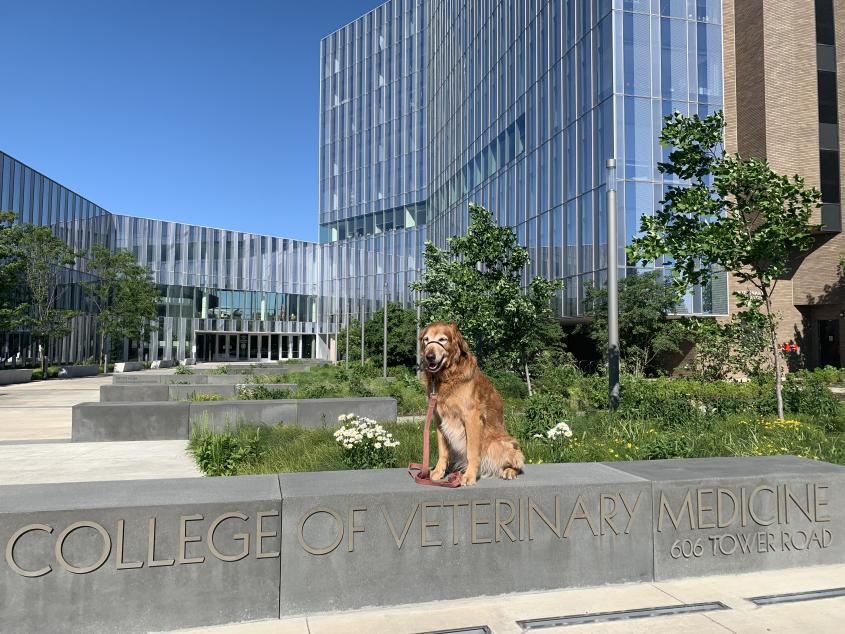Science offers comfort through compassionate biobanking
An oncologist and a lovable golden retriever tell a powerful story of hope; both live on in the Cornell Veterinary Biobank – the late Dr. Kristy Richards ’90 not only through her legacy of mentorship, resilience and kindness, but through samples collected as she battled a rare form of breast cancer. And with more than 70 canine samples to his credit, Huckleberry Finn’s pawprints are all over the biobank as its most prolific canine contributor before his passing in 2022.
Their far-reaching impact continues to fuel scientists around the world in the areas of translational and precision medicine. Their impact on the Cornell community, of course, is more personal.
A lasting contribution
When first-time dog owner Dr. Jess Hayward brought Huckleberry home, she was hoping that she could keep up with him. The bouncy golden retriever puppy proved a quick study, in no time learning to play the piano, pick up the recycling and even sneeze on command. “He was amazing,” said Hayward, a data scientist working on translational research with the Cornell Veterinary Biobank. Losing him at ten was not what she had hoped for.
When Huck joined the family, Hayward was a postdoctoral researcher at Cornell, not working directly with the biobank, but familiar with its work. As the first of its kind in the nation, the biobank gathers all kinds of samples from all types of animals and stores them for use by researchers around the world.
Huck's routine veterinary appointments would include an extra vial of blood to stash away in the cryogenic freezer for future research. His “healthy” status made him the perfect control for any number of projects.
When diagnosed at age nine with hepatocellular carcinoma, his legacy only deepened. Hayward remembered his annual checkup as he went into the appointment “acting perfectly normal,” but his bloodwork came back showing liver enzymes through the roof. After an ultrasound, doctors said the tumor was too large and could not be surgically removed.
Unwilling to give up, Hayward applied for – and received – a Riney Canine Health Center grant to look at DNA circulating in the bloodstream of dogs with liver cancer, with the idea that a blood test could someday lead to earlier detection. Sadly, the grant was due the day Hayward lost Huck. After traveling through Ithaca for one last visit to all his favorite places, Jess and her husband Michael said their goodbyes at Cornell and Huck made his final contribution to the biobank and the science that will someday save other lives.
“He made a final donation of his whole body. The biobank team did a postmortem collection and took as much as they could for whatever they needed. He’s going to contribute to as much research as he possibly can, whether it’s my own or others,” said Hayward, noting that through his samples, he he’s posthumously participating in more than 10 projects worldwide. “That helps us a lot.”
A legacy of hope
The bitter and the sweet have met before at the biobank. Trained in human oncology, Dr. Kristy Richards ’90 joined the Cornell College of Veterinary Medicine (with a joint appointment at Weill Cornell Medicine) in 2015 and immediately saw the potential of the biobank and the thousands of samples housed on the Ithaca campus. She fervently believed in biobanking and the people involved and helped take Cornell’s program – the first accredited biobank of any kind – to the next level.
Diagnosed with a rare breast cancer in 2017, Richards donated her own samples to research. Cornell – and all those she touched – lost Kristy on March 30, 2019. In those precious last weeks, as friends gathered to help and support her, Dr. Marta Castelhano recalls long conversations about the biobank and what it means to contribute.
“Kristy told me, ‘I don’t want patients to die a second death in a freezer, so let’s make sure my samples are used so the next person doesn’t have to go through this,’” Castelhano, an associate research professor and director of the biobank recalls. “That became our motto in the biobank, that our donors don’t die a second death, that we hold a freezer full of hope.”
Within days of her passing, the team set about securing her legacy, submitting not only an application for the first-ever biobank accreditation through the American Association for Laboratory Accreditation, but a proposal for a $2.5 million grant that would forever join the biobank with the Dog Aging Project (DAP), a nationwide, multi-year longitudinal study of over 45,000 dogs.
“It was all coming at the same time,” said Castelhano. “We knew we were losing Kristy, but we also knew what all of this meant to her. We had to finish it.”
Castelhano knows Richards was with them when they received the accreditation and the DAP grant. The biobank even expanded the team to include Hayward through a grant to continue Richards’s work of connecting translational scientists across veterinary and medical schools. She now works on translational research projects comparing data from dogs and humans to help both live better lives.
The long list of biobank core values doesn’t list Richards by name, but any one of them can be traced to her legacy.
“She lives on in what we do, who we are, how we interact with the clients. She shows up in every decision I make in the biobank,” says Castelhano, who will tell you she doesn’t go a day without thinking of Richards. “The mentorship, the resilience, the kindness, and all that Kristy was lives on through the biobank. “It’s a legacy of hope.”
Written by Paula Piatt






